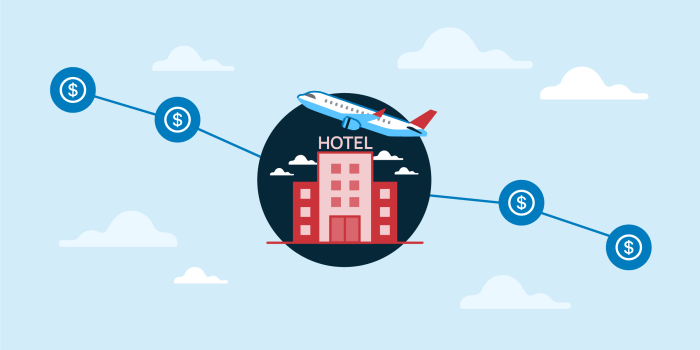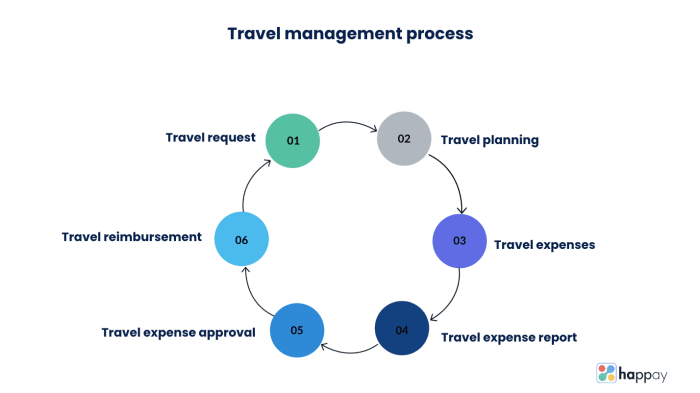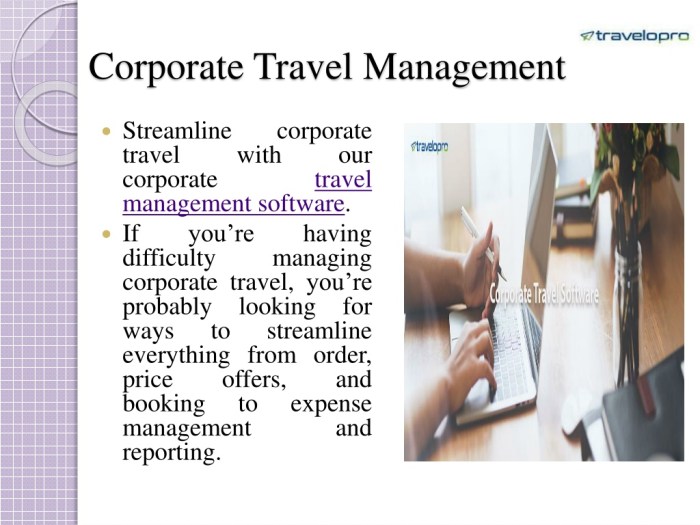Corporate Travel Management Platforms A Comprehensive Guide
Corporate travel management platforms are transforming how businesses manage employee travel. These platforms streamline the entire process, from initial booking to expense reporting. They offer a range of functionalities, from simple booking tools to sophisticated reporting and analytics. Understanding the various types of platforms, their features, and their potential benefits is crucial for any organization looking to optimize its travel spending and improve employee experience.
This guide delves into the world of corporate travel management platforms, exploring their key functionalities, benefits, and drawbacks. It compares different types of platforms, including cloud-based and on-premises solutions, highlighting their strengths and weaknesses. The analysis also examines the evolving trends in the industry, including the role of technology and sustainability in shaping the future of corporate travel.
Overview of Corporate Travel Management Platforms

Source: spotnana.com
Corporate Travel Management Platforms (CTMPs) are sophisticated software solutions designed to streamline and optimize corporate travel processes. They encompass a wide range of functionalities, from booking flights and hotels to managing expense reports and providing insightful analytics. By automating tasks and centralizing data, CTMPs significantly reduce administrative burdens and improve the overall travel experience for employees.
Key Functionalities of a Typical CTMP
CTMPs offer a comprehensive suite of features to manage the entire travel lifecycle. These features are crucial for efficiency and cost control. Crucial functionalities include:
- Booking and Sourcing: CTMPs provide a centralized platform for employees to book flights, hotels, and other travel arrangements. They often integrate with multiple travel providers, allowing for comparison and negotiation of rates, ultimately driving down costs. Sophisticated algorithms can tailor recommendations based on employee preferences and company policies.
- Expense Reporting: A critical component, expense reporting functionalities allow employees to submit receipts and track their expenses, automatically categorizing them for easy reconciliation. This automated process enhances accuracy and minimizes delays in reimbursement.
- Policy Management: CTMPs enable companies to enforce travel policies effectively. These policies can dictate everything from permissible destinations to preferred suppliers, ensuring compliance with corporate guidelines. This feature is critical for maintaining control over travel spending and ensuring compliance with regulations.
- Reporting and Analytics: Powerful reporting capabilities allow companies to track travel spend, identify cost-saving opportunities, and gain insights into employee travel patterns. These data-driven insights can be leveraged for strategic decision-making, such as negotiating better rates with suppliers or implementing more effective travel policies.
- Integration and Collaboration: Modern CTMPs often integrate with other business applications, such as financial systems and HR platforms. This seamless integration enhances data flow and collaboration, making travel management a more integrated part of the broader business ecosystem.
Types of Corporate Travel Management Platforms
Different CTMPs cater to diverse needs and budgets. The key distinctions lie in deployment methods.
- Cloud-Based CTMPs: These platforms are hosted on a remote server, typically managed by a third-party provider. The cloud-based approach offers scalability, flexibility, and accessibility from any location with an internet connection. It typically requires less upfront investment and ongoing maintenance.
- On-Premise CTMPs: These platforms are installed and maintained on a company’s servers. This approach provides greater control and customization, but it often requires significant upfront investment and ongoing IT support.
Comparison of CTMP Features
The following table articulates the key differences between cloud-based and on-premise CTMPs in terms of their core functionalities.
| Feature | Cloud-Based | On-Premise |
|---|---|---|
| Booking | Offers a wide range of booking options, often integrating with multiple travel suppliers, and provides real-time availability and pricing. Users can access the platform from anywhere with an internet connection. | Provides a tailored booking experience, often with specific integration options with the company’s preferred travel partners. Access is restricted to the company’s internal network. |
| Reporting | Provides comprehensive reporting and analytics tools to monitor travel spending, identify trends, and generate custom reports. Data is typically stored securely in the cloud. | Offers reporting tools, but the reporting and analysis capabilities might be less comprehensive than cloud-based options, depending on the platform. Data is stored on the company’s servers. |
| Expense Management | Supports automated expense reporting and reimbursement processes, often with robust receipt capture and categorization features. | Provides expense management functionalities but might require more manual processes for receipt submission and approval. |
Benefits and Drawbacks of Using CTMPs
Corporate Travel Management Platforms (CTMPs) offer significant advantages for businesses seeking to streamline and optimize their travel programs. They provide a centralized system for managing all aspects of travel, from booking flights and hotels to expense reporting, ultimately improving efficiency and cost-effectiveness. However, implementing a CTMP isn’t without its potential challenges. Understanding both the benefits and drawbacks is crucial for companies considering the adoption of a CTMP.
Advantages of Using a CTMP
CTMPs offer a multitude of benefits for businesses of all sizes. Centralized booking and management significantly reduce administrative overhead, freeing up valuable employee time for more critical tasks. Real-time reporting and analytics allow for better cost control and the identification of areas for potential savings. Advanced features like automated expense reporting and policy enforcement help ensure compliance and maintain accurate records. Additionally, CTMPs can often negotiate better rates with travel providers due to their bulk purchasing power. This can translate into substantial savings for the organization.
Disadvantages and Challenges of Implementing a CTMP
While CTMPs offer significant advantages, their implementation can present certain challenges. One key issue is the initial setup and training required for employees. A lack of proper training can lead to confusion and inefficiencies in the early stages of implementation. Furthermore, companies may face difficulties integrating the CTMP with existing systems. This integration can be complex and require significant time and resources. Data migration from legacy systems to the new platform can also pose a challenge. Moreover, choosing the right CTMP for specific business needs is critical; a poor fit can lead to frustration and inefficiencies.
Cost-Effectiveness of Different CTMPs
The cost-effectiveness of different CTMPs varies considerably, depending on factors like the platform’s features, the size of the organization, and the volume of travel. Some platforms may offer more comprehensive features but come with higher implementation and maintenance costs. Businesses need to weigh the cost of the platform against the potential savings it can generate to ensure a positive return on investment. For example, a company with infrequent travel might not see the same level of cost savings as a company with extensive international travel.
Factors to Consider When Choosing a Suitable CTMP
Several factors should be considered when selecting a suitable CTMP for a company. These factors include the volume and frequency of travel, the specific travel policies of the company, and the company’s existing travel management processes. The company’s budget and the anticipated return on investment are also crucial considerations. Further, the platform’s user-friendliness and ability to integrate with existing systems should be evaluated thoroughly. A platform that is easy to use and navigate will reduce the training burden and improve employee adoption rates.
Cost Comparison of Different CTMPs
| CTMP | Implementation Cost | Annual Maintenance Cost | Savings Potential |
|---|---|---|---|
| Platform A | $5,000 – $10,000 | $2,000 – $4,000 | $10,000 – $20,000+ |
| Platform B | $10,000 – $20,000 | $3,000 – $6,000 | $15,000 – $30,000+ |
| Platform C | $20,000 – $40,000 | $5,000 – $10,000 | $25,000 – $50,000+ |
Note: Costs are estimates and may vary based on specific features, contract terms, and company-specific requirements.
Trends and Future of Corporate Travel Management

The corporate travel management landscape is rapidly evolving, driven by technological advancements and shifting priorities. Businesses are increasingly seeking solutions that optimize travel experiences, reduce costs, and enhance sustainability practices. This dynamic environment demands a forward-thinking approach to travel management, focusing on innovative tools and strategies.
Emerging Trends in Corporate Travel
Corporate travel is moving beyond simple booking and expense reporting. Companies are now demanding more sophisticated solutions that integrate with existing business systems and streamline the entire travel process. This includes advanced analytics to identify cost-saving opportunities and personalize travel experiences. A key trend is the rise of AI-powered travel assistants, offering real-time recommendations and automated tasks. Furthermore, employee preferences and needs are increasingly driving travel decisions, with a focus on flexibility and personalized itineraries.
Technology’s Role in Shaping CTMPs

Technology is profoundly reshaping corporate travel management platforms (CTMPs). Modern CTMPs leverage machine learning algorithms to analyze travel patterns, identify cost-saving opportunities, and proactively suggest optimal travel choices. Integration with other business applications is crucial for seamless data flow and real-time insights. For instance, integrating with project management software allows for more accurate forecasting of travel needs and streamlined expense reporting. The use of mobile applications further enhances accessibility and control over travel arrangements for both travelers and administrators.
Sustainability and Environmental Factors
Sustainability is no longer a niche concern but a core business imperative. Corporate travel decisions are increasingly factoring in environmental impact. CTMPs are evolving to incorporate features that allow companies to track carbon emissions, offer sustainable travel options (e.g., public transport, eco-friendly hotels), and report on their environmental footprint. For example, many companies are now implementing carbon offsetting programs, allowing them to neutralize the environmental impact of business travel.
Innovative Features in Modern CTMPs
Modern CTMPs offer a wide range of innovative features beyond basic booking and expense reporting. These include AI-powered travel assistants that suggest optimized routes, negotiate better rates, and personalize travel experiences based on employee preferences. Real-time reporting and analytics dashboards provide insights into travel costs, trends, and compliance issues. Furthermore, mobile apps allow for instant access to booking, itinerary management, and expense tracking, enhancing flexibility and convenience.
Evolution of CTMP Functionalities
| Year | Key Feature | Description |
|---|---|---|
| 2010 | Basic Booking and Expense Reporting | CTMPs primarily focused on facilitating travel bookings and expense tracking. Limited integration with other systems. |
| 2020 | Advanced Analytics and AI Integration | CTMPs began incorporating data analytics to identify cost-saving opportunities, personalize travel experiences, and utilize AI for tasks like route optimization and rate negotiation. |
| 2025 | Predictive Analytics and Sustainable Travel Options | CTMPs will utilize predictive analytics to forecast travel needs and offer comprehensive, sustainable travel options, including carbon emission tracking and offsetting. Integration with environmental databases will be common. |
Closing Notes

Source: cloudfront.net
In conclusion, corporate travel management platforms offer significant advantages for businesses, enabling efficient booking, cost control, and streamlined expense reporting. While implementation costs and potential challenges exist, the potential for savings and enhanced employee experience often outweigh these considerations. Staying informed about emerging trends, including the integration of sustainability and technology, is crucial for companies seeking to leverage these platforms effectively in the future. Choosing the right platform depends on factors like budget, company size, and travel volume. The future of corporate travel is intertwined with these powerful platforms.





